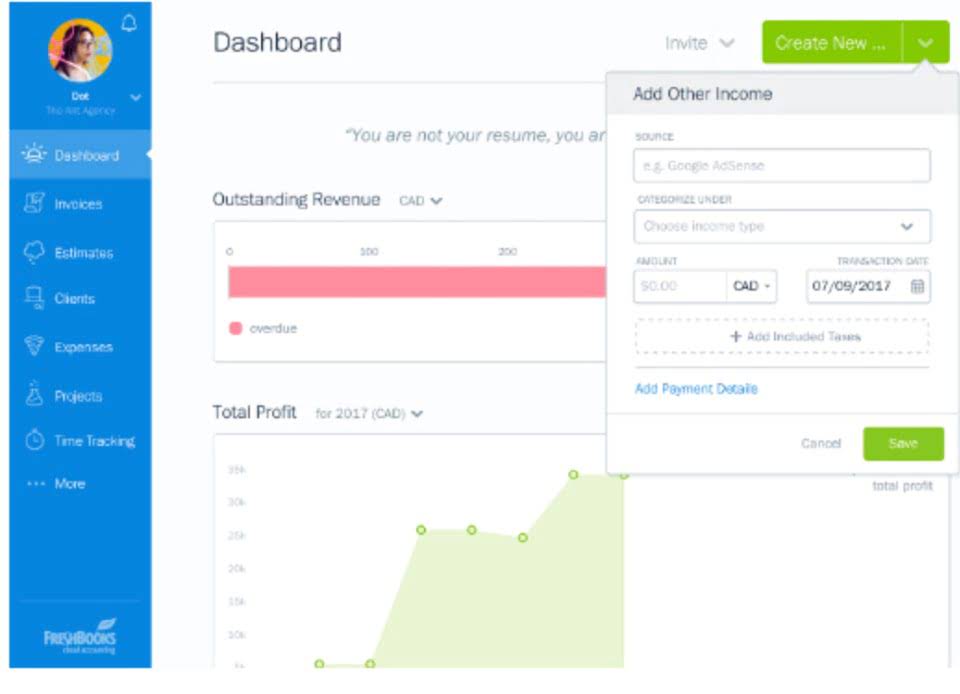
You might be on the moon after making a $50k profit on a $150k property, provided you spent $10k for maintenance. However, you might miss that you did better last year when you flipped a property at $150k after purchasing it at https://www.bookstime.com/ $100K and spending $12.5K on it. The gross profitability in the first scenario is less than ( 20%) in the second one (25%). Imagine how stressful it would be to look for months-old receipts just before your tax-filing deadline.
Real Estate Bookkeeping Solutions
- Robust feature set includes thorough record-keeping, comprehensive reporting, excellent invoicing and inventory management, plus a capable mobile app.
- Many or all of the products featured here are from our partners who compensate us.
- When buying your first investment property, it’s essential to explore the available loan options.
- And you can assess your assets’ financial standing by adopting proper real-estate bookkeeping.
- Sage 50 Accounting, unlike some of its competitors, offers inventory management and job costing features at all plan levels.
- By the time a property closes, there are dozens of transactions related to the realtor and their clients.
Appliances, furniture, and improvements depreciate faster over 5-15 years. Bookkeeping needs to factor timeframes, depreciation methodology (straight-line most commonly), allowed deductions, and recaptured depreciation if sold. Upon selling, intricate tax calculations on capital gains also apply made easier through strong bookkeeping. Real estate accounting is essential to the success and daily operations of real estate agents and firms. They help mitigate risks and the chance of tax noncompliance, as well as provide undeniable advantage in a competitive market. Overall, accountants help real estate agents and real estate firms make smarter financial decisions by giving them an accurate, high-level view of their business performance.
Choose an entry system
- Be sure to include both business and personal expenses, as well as any repairs or improvements made to the property.
- Imagine how stressful it would be to look for months-old receipts just before your tax-filing deadline.
- If your real estate business has multiple arms (like an agent arm and an investment property arm), you may want to consider establishing multiple LLCs or keeping the books for each business channel separate.
- Also, calculate any interest you owe or can deduct from the security deposit.
Starting a real estate business can be a great way to earn a steady income, but it’s important to keep on top of your bookkeeping from the very beginning. A business bank account is a must-have for any real estate business, and it’s important to keep track of all your business and personal transactions. An effective bookkeeping system will help you keep track of rental income and expenses so that you can maximize your profits. As a real estate investor, it’s crucial to keep track of your business and personal finances. This can be a challenge, especially if you have multiple rental properties. One way to simplify the process is to create a system for tracking expenses.
Bookkeeping tips for real estate businesses
- If you want to streamline your tax filing, start reviewing your books in the fall.
- It is possible to purchase cloud access so your team can better collaborate and access the software and its data from anywhere, but costs add up quickly with an additional monthly charge per user.
- Like its name suggests, open-source software is open to the public, meaning anyone can access and tweak its code.
- A bookkeeper’s work is applicable across many different types of industries — after all, every business needs to track and optimize its finances.
Money that flows into and out of your real estate business should be categorized and posted to the property account. Rental property financial management software such as Stessa automatically tracks income and expenses and auto-categorizes them for easy reporting. Real estate accounting refers to the monthly and yearly financial tasks a business owner must perform to keep their operations running smoothly. More specifically, real estate accounting deals with the potential revenue generated by properties and matters of taxation, including crucial real estate agent tax deductions. Also, the specifics of a bookkeeping service for real estate agents might look a little different from bookkeeping for real estate investors. Communicating your needs to your virtual bookkeeping service is essential to setting up the right team.


According to 81 percent of CBs who interviewed for a new job after becoming certified, having a certification contributed to getting the interview [4]. With a certified bookkeeper designation, you are qualified to perform all critical functions through the adjusted trial balance and basic payroll for small to medium-sized businesses. Small businesses may prefer to handle their books themselves, but hiring a professional bookkeeper can be helpful. Bookkeepers are important professionals in today’s economic and financial fields.
Setting up the Right Bookkeeping System for Your Real Estate Business
To help determine your niche, you should also research the market to determine what bookkeeping businesses are already established and which industries they serve. Integrity and trustworthiness are important qualities to cultivate as a bookkeeper. Keep an organization’s financial data confidential and be transparent about your bookkeeping activities.

- Shoeboxed can help real estate agents simplify bookkeeping, save time, track accurately, and focus on what they do best—assisting clients in buying and selling.
- She is a former Google Tech Entrepreneur and she holds an MSc in International Marketing from Edinburgh Napier University.
- In accounting, a debit increases the value of accounts (a positive number) while a credit decreases the value of accounts (a negative number).
- She has specialized in financial advice for small-business ownersfor over a decade.
If you’re working with a real estate brokerage to build up your business and brand name, make sure you have a clear idea of your commission fees and opportunities. Each brokerage charges its own commission structure and creates opportunities for real estate agents to negotiate their percentages, signing bonuses, and other earnings. Even if you’re just starting out, you can create processes that help you to scale—and to keep as much commission as you can. Real estate agents deal with hundreds of tasks throughout the property buying and selling process. They have costs to market themselves, improve properties, pay a variety of fees, and split the commission. Timely 4th quarter estimated tax payments are crucial to avoid penalties and maintain financial stability.
As the payments progress, the interest portion decreases, and the principal portion increases. With every payment, the outstanding amount gets smaller until the loan is paid off in full. For instance, let’s examine a property valued at Rs 1 crore with a 20% down payment and a 10% interest rate over 20 years. Over 20 years, the total amount paid would be Rs 1,95,18,000, with Rs 95,18,000 being the interest.
Real estate accounting involves performing monthly and yearly financial tasks to ensure smooth operations and strong cash flow. Blurring the lines between personal and business funds can lead to complicated tax issues and potential financial confusion. For transparency and accuracy, it is essential to set up separate bank accounts for your personal finances and your business transactions. This allows you to clearly bookkeeping for real estate agents track your real estate-related income and expenses separately from your personal expenses. Remember, mingling personal and business funds can raise red flags during audits and may impact your ability to accurately analyze your business’ financial performance. Keeping these funds separate is a best practice in real estate accounting that contributes to the overall financial health and integrity of your business.
A final note on buying your first investment property
Performing a monthly review of your accounts, whether through an automated accounting system or with a financial manager, is crucial to catch any errors and make necessary adjustments promptly. Understanding the distinction between bookkeeping and accounting instills confidence and enables you to delegate responsibilities to other professionals in these critical areas. Remember, avoiding these common mistakes can save you from future headaches and ensure your real estate business runs smoothly and efficiently.